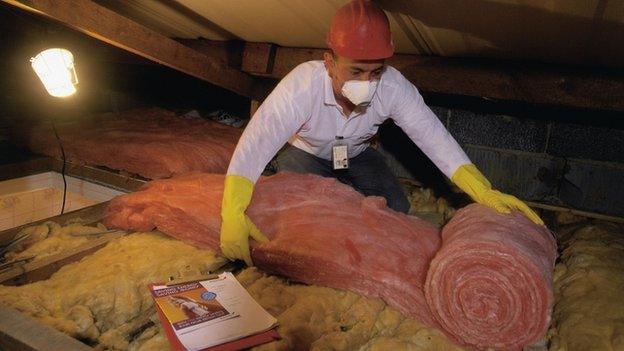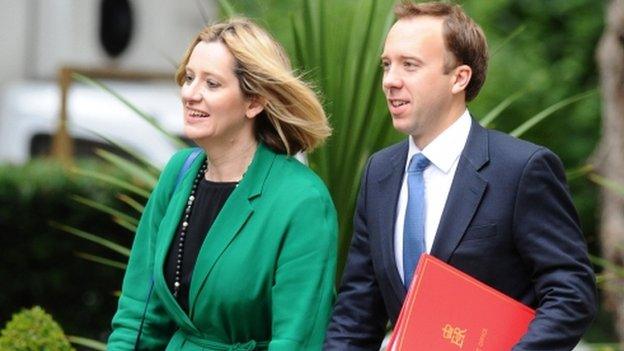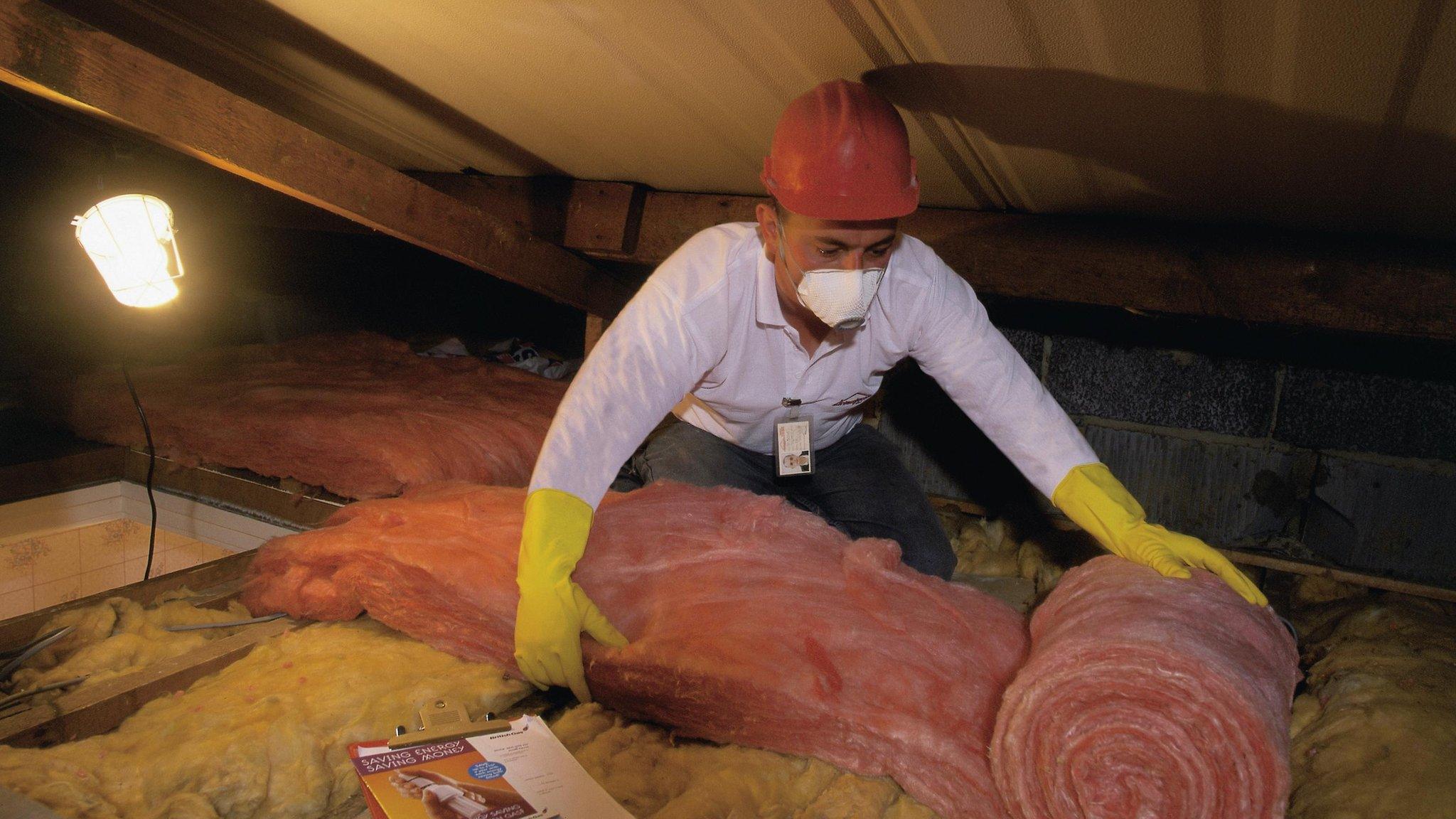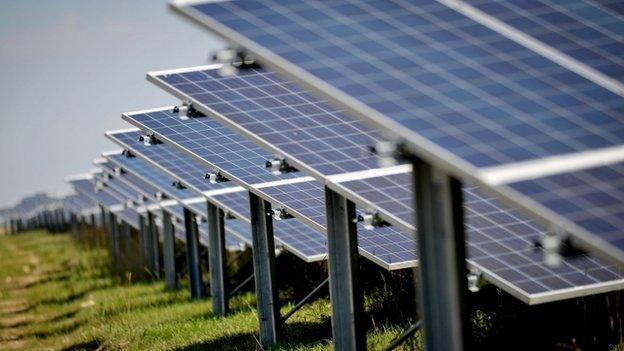Green Deal funding to end, government announces
- Published

The government has announced it is to cease funding for the Green Deal, spelling the end for its flagship energy household efficiency programme.
The scheme offers cashbacks and incentives on such things as double-glazing, insulation and boilers.
The Department for Energy and Climate Change said it took the decision to protect taxpayers, citing low take-up and concerns about industry standards.
Labour said ministers' approach to energy efficiency had been a "failure".
The Department for Energy and Climate Change (Decc) said it would work with the building industry and consumer groups to agree a new "value-for-money approach".
Future schemes needed to provide better value for money, and support the goal of insulating one million more homes and the government's commitment to tackle fuel poverty, it said.
The announcement comes a day after the government said it would be consulting on whether to end subsidies for many new solar farms.
'Value for money'
Announcing an end to future funding of the Green Deal Finance Company, which delivers the scheme, Energy and Climate Change Secretary Amber Rudd said: "We are on the side of hardworking families and businesses - which is why we cannot continue to fund the Green Deal.
"It's now time for the building industry and consumer groups to work with us to make new policy and build a system that works.
"Together we can achieve this government's ambition to make homes warmer and drive down bills for one million more homes by 2020 - and to do so at the best value for money for taxpayers."

Roger Harrabin, BBC environment analyst
Today's decision has caused anger - not because anyone really likes the Green Deal, but because it is being scrapped without a replacement in sight.
The home insulation industry says it will create huge uncertainty for firms while the government works out what the replacement policy should be.
There is no doubting the need for a scheme to finance improvements in home energy.
The UK has some of the worst insulated housing stock in Europe, and saving energy is by far the cheapest way of the UK cutting carbon emissions and bringing people out of fuel poverty.
The government is accused of lacking ambition in this area: last parliament it prompted the insulation of 5 million homes. This parliament it aims to improve just one million.
Campaign group the Energy Bill Revolution says the obvious solution is to take some of the government's projected £100bn infrastructure spending and use it for insulating homes. This would give better value for money than roads and railways, it says.
The campaign group insists that, unlike the Green Deal, the replacement scheme should be low interest and simple to use.

The Green Deal home improvement fund cashback scheme, which offers people money instead of loans in return for energy efficiency measures, is also to lose its funding.
The Green Deal was launched by the previous coalition government, and applies in England, Wales and Scotland.
Under the scheme, householders can use cheap long-term loans to make their homes more energy efficient and cut bills with no upfront cost - and which are then repaid, with interest, through energy bills.
However, the first round was criticised for being complicated and low on take-up, with only 1,754 householders signing up to the scheme.
And the parliamentary Energy and Climate Change Committee said the Green Deal had "failed to live up to expectations" and that its implementation had been "poor".
"Rather than facilitating access to energy efficiency measures and creating momentum in the market, the Green Deal has caused frustration and confusion for both consumers and the supply chain," the MPs said.
'Wrecking ball'
Responding to the announcement, shadow energy and climate change minister Jonathan Reynolds said the Green Deal had been "a flop from start to finish".
"Today's announcement simply serves to confirm that the government's approach to energy efficiency has been a complete and utter failure," he said.
He added that the government must "urgently" set out what plans it had to replace the Green Deal, stressing that home energy efficiency improvements helped to reduce consumer bills.

Ms Rudd (l) said a new policy would need to provide value for money
Green MP Caroline Lucas accused the government of taking a "wrecking ball" to climate and energy policies, and criticised ministers for making the announcement during the summer recess, accusing them of "evading parliamentary scrutiny".
UK Green Building Council chief executive Julie Hirigoyen said the government's strategy for cutting high energy bills through energy saving measures such as insulation was now "dead in the water".
"This is yet another announcement with no forewarning that will leave the energy efficiency industry battered and bruised," she added.
Greenpeace UK head of energy Daisy Sands, head of energy at Greenpeace UK, said that "The Green Deal was far from being a success, but coming right after the scrapping of the zero-carbon homes target, this latest move suggests ministers are giving up on efficiency."
But former Conservative energy minister Greg Barker said he was "very relaxed" about the move.
Mr Barker said finance was "no longer the key barrier", adding: "The Green Deal market will remain and grow but private finance will be able to finance these installations just as efficiently as Green Deal could."
- Published7 October 2014

- Published9 June 2014

- Published22 July 2015

- Published20 August 2013
